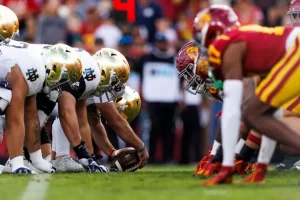Urban Meyer is a name that resonates across college football. He’s a three-time national champion, a coaching legend, and a figure whose opinion still commands attention—sometimes too much of it. But as respected as Meyer’s résumé may be, recent comments from the former Florida and Ohio State head coach reveal just how out of touch he has become with the modern dynamics of college football, particularly when it comes to the Southeastern Conference.
In a recent appearance on a national broadcast, Meyer made several statements about the current state of the SEC that were not only dismissive but simply inaccurate. He claimed the SEC was “no longer the gold standard,” that teams like Alabama were “slipping,” and that programs such as Georgia, LSU, and even Texas A&M had “overachieved without delivering.” He even went as far as suggesting that Big Ten teams—most notably his former school, Ohio State—were better coached, more disciplined, and better equipped to succeed in the College Football Playoff era.
Let’s be clear: Urban Meyer is wrong. Dead wrong. And on behalf of Alabama Football, along with several other SEC programs that continue to dominate on and off the field, it’s time to set the record straight.
Since the inception of the College Football Playoff in 2014, the SEC has reigned supreme. The conference has won six of the ten national titles awarded, with Alabama capturing three and LSU and Georgia adding one each. Meanwhile, the Big Ten has managed only a single title—Ohio State’s win in the inaugural 2014 season under Meyer himself.
So when Meyer suggests the SEC is no longer dominant, what metric is he using? Certainly not championships. Not playoff appearances. And definitely not recruiting, where SEC schools routinely finish with the highest-rated classes year after year.
Alabama alone has finished with the No. 1 or No. 2 recruiting class in eight of the last ten cycles. Georgia is on a similar trajectory. LSU, Tennessee, Texas A&M, and Florida have all had top-10 finishes. Even emerging programs like Ole Miss and Kentucky have developed rosters stacked with future NFL talent.
The SEC isn’t just surviving; it’s thriving. It remains the most talent-rich, competitive, and physically demanding conference in the nation. No conference matches the weekly grind or the postseason success.
Let’s address the biggest elephant in the room—pun intended.
Meyer suggested Alabama was “slipping,” pointing to their two-loss season in 2022 and missing the Playoff. But let’s look closer. Alabama was a last-second field goal against Tennessee and an overtime two-point conversion at LSU away from being undefeated. In 2023, they won the SEC and reached the CFP again, with one of the most impressive mid-season turnarounds under Nick Saban.
Calling that “slipping” is disingenuous. It’s the kind of criticism that would never be levied against a Big Ten program for the same performance. Only in the SEC can winning 11 games and a New Year’s Six bowl feel like a disappointment—and that’s a testament to the conference’s elevated standards, not a sign of regression.
Even if Meyer wants to claim Alabama’s reign is over (a premature judgment at best), Georgia has clearly taken the baton without losing a step. Kirby Smart has built a juggernaut in Athens, winning back-to-back national championships in 2021 and 2022 and going undefeated in the regular season in 2023.
Georgia is the model of consistency, with top-tier recruiting, a disciplined culture, and elite player development. They don’t rebuild—they reload. And if the SEC is supposedly in decline, Georgia didn’t get the memo.
Meyer also disparaged the SEC’s “middle class,” implying that programs outside the blue bloods haven’t lived up to their potential. Again, this statement doesn’t hold up to scrutiny.
Tennessee under Josh Heupel has seen a remarkable resurgence, defeating Alabama in 2022 and finishing in the top 10. Lane Kiffin has made Ole Miss a consistent threat. Shane Beamer has South Carolina overachieving and upsetting top teams. Kentucky has developed into a gritty, physical program that punches above its weight, and Missouri had its best season in over a decade in 2023.
Even the so-called “underperforming” teams Meyer criticized—like Texas A&M—have retooled with coaching changes and now boast rosters capable of making serious noise in the Playoff format, especially with the expanded 12-team field.
One thing Meyer seems to forget—or chooses to ignore—is the cultural difference in the SEC. Football isn’t just a game in the South. It’s a lifestyle, a religion, and an identity. The fan bases are unmatched in their loyalty and intensity. The stadiums are the largest and loudest. The pressure to win is constant.
That crucible creates a competitive edge that no other conference can replicate. SEC players are battle-tested every Saturday. By the time they reach bowl season or the College Football Playoff, they’re prepared for any environment.
Big Ten teams, by contrast, often get exposed on the national stage. Michigan’s recent Playoff performances come to mind, including a 2022 semifinal loss to TCU—a team that Georgia then obliterated 65-7.
That’s the difference in caliber.
Another of Meyer’s assertions is that Big Ten coaches are more “disciplined” and better “teachers.” This is laughable.
Nick Saban is widely regarded as the greatest coach in college football history. Kirby Smart is crafting a dynasty of his own. Brian Kelly left Notre Dame to challenge himself in the SEC and reached the SEC title game in year one. Josh Heupel turned around Tennessee faster than anyone thought possible. Hugh Freeze is expected to elevate Auburn, while Billy Napier and Mike Elko are bringing structure and momentum to Florida and Texas A&M.
Meanwhile, the Big Ten is largely a two-team race between Michigan and Ohio State—both of which have struggled to break through the SEC stranglehold. Outside of those two programs, the coaching talent drop-off is significant.
As if the SEC needed more strength, it’s about to add Texas and Oklahoma in 2024. Both programs bring rich histories, enormous fan bases, and deep pockets. Texas is recruiting at an elite level under Steve Sarkisian, while Oklahoma remains a national brand with championship potential.
Their arrival only further tilts the balance of power toward the SEC. If the conference was dominant before, it’s about to become an even greater superpower.
So why would Urban Meyer make these claims? Perhaps it’s bias. He’s a Big Ten loyalist, an Ohio State icon, and someone who still carries animosity from his battles with the SEC while at Florida.
Maybe it’s nostalgia. College football has changed drastically since Meyer last coached at the collegiate level. The transfer portal, NIL, and expanded Playoff system require adaptability—something Meyer struggled with in his later coaching years.
It could also be simple provocation. Controversial takes drive ratings. Meyer knows his words will rile up SEC fans, create headlines, and spark debate.
But regardless of his motives, his comments simply don’t align with the reality of today’s college football landscape.
Urban Meyer can say what he wants. But those who truly understand the game—who watch the battles in the trenches, follow the recruiting trails, and track the postseason results—know the truth.
The SEC is not in decline. Alabama is not “slipping.” Programs like Georgia, LSU, Tennessee, and others are not “overachieving”—they’re delivering. Consistently.
The SEC remains the pinnacle of college football. It’s where champions are made, where the competition is fiercest, and where the standard is highest. Urban Meyer may have forgotten that. The rest of us haven’t.
And when the confetti falls on the next national champion, don’t be surprised if it’s an SEC team once again—proving, for the umpteenth time, that the road to college football greatness still runs through the South.





